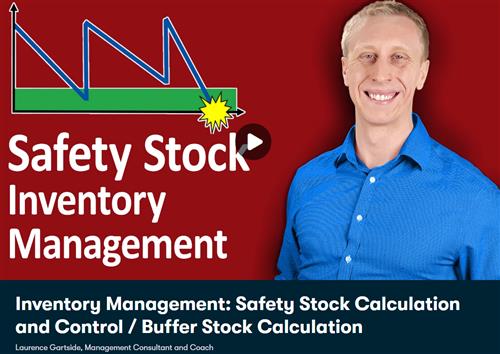Inventory Management Safety Stock Calculation and Control Buffer Stock Calculation

Duration: 2h 25m | Video: .MP4 1280×720, 30 fps(r) | Audio: AAC, 48000 Hz, 2ch | Size: 1.16 GB
Genre: eLearning | Language: English
Optimize your Supply Chain Safety Stock / Buffer Stock. Simple to Advanced Methods. Reduce Costs and Risk in your Business Operations.
What you’ll learn
How to Calculate Safety Stock
Inventory Dynamics – how to Control your Inventory Levels over time to make Better Decisions
Alternative Approaches to holding Safety / Buffer Stock
Use Statistics to Model your Lead Time Demand
Why Bond cant eat Lobster…..
Super Simple to Super Detailed Methods
Demand and Lead Time Management to Reduce your Need for so much Safety Stock
Quantify the Probability of you having a Stockout in a given period of time
Determine the Optimum “Service Level” for your Inventory
Requirements
High School Maths (Age 17 ish)
Basic Microsoft Excel
A desire to save a ton of money through your robust inventory management!
High tolerance for dubious humour
Description
This MBA style course prepares and empowers you to calculate and control your Safety Stock. A crucial area of Inventory Management.
The eternal question:How to balance the risk of stock-outs with the quantity of safety stock inventory held?…
We cover3 methods to calculate your Safety Stock- from supersimple to advancedstatistics:
Method 1: Number of Days of Safety – A fast and very basic method to get a quick decision
Method 2: HiHi-AvAv (my own name for a very established method 😉 Finding the difference between our high “Lead Time Demand” and the average to determine the level of cover we want from periods of high demand during a slow replenishment lead time.
Method 3: Statistical Method – The most rigorous method. We model our “Lead Time Demand” as a “Normal Distribution”, determine our desired “ServiceLevel” (acceptable risk of a stockout) and use a little help from some excel formulas to calculate our required Safety Stock and Re-Order Point quantity.
Course Sections:
1. Inventory Control Introduction
2.Safety Stock Background
3.Inventory Dynamics
4.Simple Safety Stock Calculations
5.Calculating Safety Stock using Statistics
6.Getting Your Data
7.Assumptions and Limitations of the Statistical Method
8.Fixed Lead Time, Variable Demand: Method 3 Continued
9.Variable Lead Time and Demand: Method 3 Continued
10.Choosing your Service Level – Your Tolerance for Risk
11.Probability of a Stockout Over Time – Calculating Risk
12. Optimizing Safety Stock Levels
13. Conclusion
14. Bonus and Appendix
This course is for dedicated operations manager, the ambitious procurement professionals, the striving logistics supervisors, hands-on production planners and the practical business optimization analysts.
Remove the guesswork and add structure to your crucial safety stock decisions.
Take control of your inventory management to have and “impact” and “improve” your business operations – manufacturing, services, industrial operations and production.
Equip yourself to take a new leading role in your workplace – improving your processes, systems & business / organization.
Quantify your risk, calculate your inventory requirements and articulate your method – removing the guesswork and fearful overstocking
Downloadable Summary PDF Documents – throughout the course
Almost all businesses have inventory: retail stores, factories, hospitals, hotels, car repair, warehousing, logistics and more – this means we all have to decide how much to hold and when to place an order from the suppliers for more. Place the order too late and, with a little extra demand than usual, you might stockout! Carry too much inventory and you pay for it in holding and financing costs every day, quietly sucking the profit from your business and crippling your cashflow and investment opportunities.
Having enough stock available whilst minimising costs and risk is the fundamental balance that can determine your business’s success. Getting a strong control and continuously improving your business operations is essential to remain competitive, improving profitability, improving customer experience and customer satisfaction, reducing costs and improving delivery.
Without a solid grasp of safety stock and methods of calculation; no operations manager, can competently or confidently manage their risk without excessive costs.
Be the one bringing clarity and structure to this most crucial decision!
Specific Topics Covered in the Course:
Why we need Safety Stock
Consequences of Stockouts
Costs of Inventory
Inventory Dynamics
Quick Calculations of Safety Stock
Rigorous Statistical Method to calculate Safety Stock
How to Model your “Lead Time Demand”
How to Determine your own desired”Service Level”
What the Probability of having a Stockout in a given period of time
How we can Reduce our Need for Safety Stock
Alternatives to holding Safety Stock
Take control! Boost your career and your business! Start learning today!
FULL COURSE CONTENTS:
Inventory Control Introduction
1. Benefits of Good Safety Stock Inventory Management
2. Bond’s Lobster Story
3. What is Safety Stock – Why do we Need Buffer Stock?
4. Much Obliged!
Safety Stock Background
5. Supply Chain Trade Offs – Risk and Consequences of Stock-outs
6. Supply Chain Trade Offs – Costs of Inventory
Inventory Dynamics
7. Basic Inventory Dynamics – Introduction
8. Basic Inventory Dynamics – Sawtooth
9. Re-Order Point and Alternatives
10. Purchasing Order Quantity Choices
11. How much Safety Stock? – Procurement’s Problem Question
Simple Safety Stock Calculations
12. Safety Stock Calculations – Introduction13. Method 1: Simple Inventory Control Formula: # Days of Safety
14. Method 1: Practice Question : # Days of Safety
15. Method 2: HiHi-AvAv – Protecting Against the Worst Case
16. Method 2: HiHi-AvAv – Explanation
17. Method 2: HiHi-AvAv – Practice 1 & Answer
18. Method 2: HiHi-AvAv – Practice 2
19. Method 2: HiHi-AvAv – Practice 2 – 2nd round
20. Method 2: HiHi-AvAv – Summary
Calculating Safety Stock: Method 3: Statistical Method
21. Service Level and Statistical Distributions
22. Introduction to the Statistical Method
23. Service Levels and Statistical Variation
24. Normal Distribution Modelling
25. Service Level Definition
26. Statistical Method – High Level Overview
27. Jumping Ahead – A quick look
28. Need to Refresh your Probability Knowledge?
29. Normal Distribution Introduction
30. Normal Distributions and Standard Deviations
31. Lead Time Demand as a Normal Distribution
32. Representing Service Level on the Bell Curve
33. Steps Overview
34. How Many Standard Deviations of Safety Stock
35. Intermediate Practice Question
36. Safety Stock in Retail – Example 2
37. Alternative Formula =norm.inv()
38. Working Backwards to find your Service Level
Getting Your Data
39. Getting your Data – Introduction
40. Finding the “Mean” and “Standard Deviation” from your Data
Assumptions and Limitations of the Statistical Method
41. Assumptions and Limitations of Method 3
Fixed Lead Time, Variable Demand: Method 3 Continued
42. Different Input Data- Introduction
43. Calculating Safety Stock: Fixed Lead Time, Variable Demand
44. Calculating Safety Stock: Fixed Lead Time, Variable Demand – Example
Variable Lead Time and Demand: Method 3 Continued
45. Variable Lead Time and Demand – Method and Example
46. Variable Lead Time and Demand – Question and Answer
47. Rounding Up or Down?… – Costs $60k!
48. Which Formula to Use? Summary
Choosing your Service Level – Your Tolerance for Risk
49. Choosing your Service Level – Introduction
50. Service Level Definition: Recap
51. What Factors should Influence how “Safe” we want to be??
52. Marginal Analysis – Choosing your Service Level
53. Marginal Analysis – Example
Probability of a Stockout Over Time – Calculating Risk
54. What’s the Probability of a Stockout? – Introduction
55. What’s the Probability of a Stockout? – Excel Tool
Optimizing Safety Stock Levels
56. When to Review and Optimize your Safety Stock
57. Reducing the Need for Purchasing Safety Stock
58. Demand Management to Reduce Safety Stock
59. Lead Time Management to Reduce Safety Stock
60. Alternatives to Safety Stock – Other Actions
Conclusion
61. Wrap Up
62. Conclusion
Bonus and Appendix
63. What’s Next- Further Reading
64. My Other Courses
65. How to Get Your Certificate
66. Hide Your Nuts!
My goodness did you read allllll that?! Time to get to the videos! 🙂
See you on the inside!
Laurence
Who this course is for:
Supply Chain Managers. Working in Operations, Manufacturing or Service sectors, Production and Industry
Purchasing / Procurement, Logistics & Customer Relationship Managers
Financial Controllers, Accountants, Business Analysts & Consultants
Small Business Owners & Operations Managers
Ambitious Self-Starters who want to have a Bigger Impact at work, Improve Things and Get Noticed
People working in Production, Manufacturing, Industrial Operations, Business Operations
A Desire to Become the Authority in your workplace on Business Inventory Management
https://www.skillshare.com/classes/Inventory-Management-Safety-Stock-Calculation-and-Control-Buffer-Stock-Calculation/2096990860
